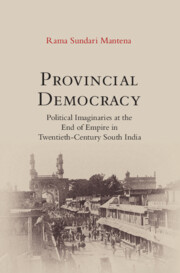Book contents
- Frontmatter
- Contents
- List of Figures
- Acknowledgements
- List of Abbreviations
- Map
- Introduction: Self-Determination, Federation, and Civil Liberties in Twentieth-Century South India
- 1 Liberalism and Anti-Colonialism in South India
- Part I Federation
- Part II Civil Liberties
- Conclusion: After Empire—Language and Regionalism
- Bibliography
- Index
5 - The Break-Up of Hyderabad
Published online by Cambridge University Press: 30 April 2023
- Frontmatter
- Contents
- List of Figures
- Acknowledgements
- List of Abbreviations
- Map
- Introduction: Self-Determination, Federation, and Civil Liberties in Twentieth-Century South India
- 1 Liberalism and Anti-Colonialism in South India
- Part I Federation
- Part II Civil Liberties
- Conclusion: After Empire—Language and Regionalism
- Bibliography
- Index
Summary
The end of the 1930s brought to the fore desperate moves on the part of the HSC (largely in agreement with the tactical strategy of the INC throughout the decade), which began to make greater political demands on the princely state of Hyderabad to bring it in line with constitutional discussions in British India and the Majlis. The Majlis by this time proclaimed that their primary purpose and immediate concern was the preservation of the Hyderabad state. They would do this by opposing the proposals for constitutional reforms drafted in several forums organized by the Nizam's administration. The stand-off between the Majlis and the HSC escalated to the point that it eventually had to be defused in order to stave off a violent encounter. As I have laid out in the previous chapters, the 1940s brought new political forces that disrupted the political impasse established by the end of the previous decade. Furthermore, the two World Wars saw the emergence of the communists as a new political force and another key player in political discussion in British India. The communists increasingly gained power and challenged the liberal stronghold in the INC. In Hyderabad, the AMS as a civil societal organization also gave space for communists, who eventually took the struggle to the Telangana countryside in the mid- and late 1940s. Mandumula Narsing Rao, a key intellectual and political activist (discussed in the previous chapters), made it a point to argue that all parties opposed British rule (thus defining them as anti-colonial)—the Majlis, the INC, the communists, and even the Nizam (the monarchical head). Yet they all expected different things in terms of what would follow after the departure of the British from the Indian subcontinent. For the INC and the communists, the goal was to bring a people's government based on representative institutions to the Hyderabad state; the Majlis sought to establish representative governmental institutions but with the Nizam as the titular head (the most complicated position, for sure—the demand for Muslim sovereignty along with popular government); and for the Nizam, it was most important to reclaim the sovereignty lost over the course of the nineteenth century.
- Type
- Chapter
- Information
- Provincial DemocracyPolitical Imaginaries at the End of Empire in Twentieth-Century South India, pp. 170 - 203Publisher: Cambridge University PressPrint publication year: 2023



